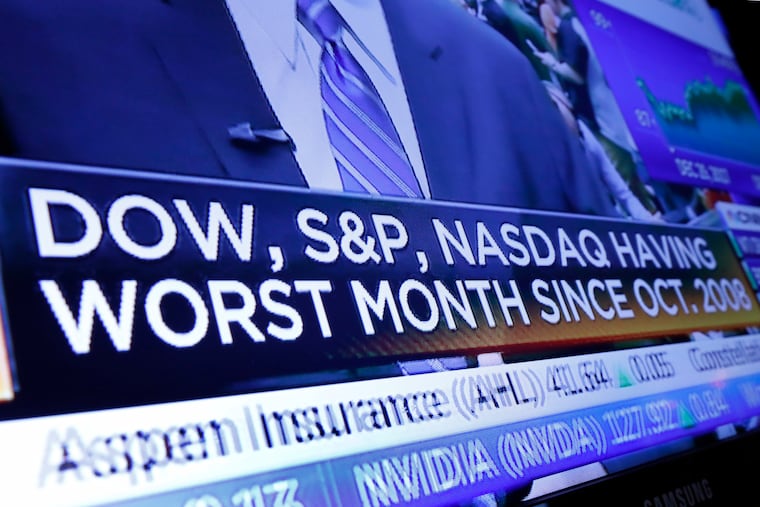US stocks head sharply lower a day after Dow’s record gain
Wall Street's wild Christmas week goes on, with the Dow Jones Industrial Average slumping nearly 300 points in early trading a day after notching its biggest-ever point gain

Wall Street's wild Christmas week rolls on.
The Dow Jones Industrial Average slumped about 300 points early Thursday, a day after notching its biggest-ever point gain, as the market endures a bout of volatility to end what has been a topsy-turvy year.
Technology companies, health care stocks and banks, all big gainers on Wednesday when the market had its best day in 10 years, accounted for much of the broad slide. Energy stocks also fell as the price of U.S. crude oil slid 1.5 percent a day after posting its biggest increase in two years.
The S&P 500 index fell 30 points, or 1.3 percent, to 2,436 as of 10 a.m. Eastern Time. The Dow slid 295 points, or 1.3 percent, to 22,582. The tech-heavy Nasdaq lost 82 points, or 1.3 percent, to 6,471. The Russell 2000 index of smaller-company stocks gave up 16 points, or 1.2 percent, 1,313.
Volatility has been the norm in December. The Dow has dropped 1 percent or more in eight of the 17 trading sessions. Even with Wednesday's big gains, the Dow, S&P 500 and Nasdaq are all down more than 10 percent for the month.
The market remains on track for its worst December since 1931, during the depths of the Depression, and could finish 2018 with its steepest losses in a decade.
The partial government shutdown that began over the weekend has weighed on the market. Investors have also been unnerved by the personnel turmoil inside the Trump administration, trade tensions with China, the slowing global economy and worries that corporate profits are going to slip sooner or later.
Technology companies, a big driver of the market's gains before the October downturn, slumped Thursday. Texas Instruments dropped 1.3 percent to $91.74.
Perrigo lost 3.3 percent to $39.36, one of the big decliners in the health care sector.
Bank stocks fell along with Treasury yields. Goldman Sachs declined 1.9 percent to $159.82 as the yield on the 10-year Treasury fell to 2.76 percent from 2.79 percent late Wednesday.
The decline in oil prices weighed on energy stocks. Marathon Petroleum slid 2.1 percent to $57.14.
Benchmark U.S. crude dropped 1.5 percent to $45.52 a barrel in New York. Brent crude, used to price international oils, was down 1.7 percent to $53.80 a barrel in London.
The dollar fell to 110.81 yen from 111.36 yen on Wednesday. The euro strengthened to $1.1405 from $1.1351.
The slide in U.S. markets followed a sell-off in major indexes in Europe.
In European markets, where trading resumed after a Christmas holiday break, the German DAX slid 2.1 percent, while France's CAC 40 gave up 0.3 percent. Britain's FTSE 100 fell 1.1 percent.
In Asian markets, the Nikkei 225 index rebounded 3.9 percent, while South Korea’s Kospi was little changed. The Hang Seng index fell 0.7 percent and Australia’s S&P-ASX 200 jumped 1.9 percent. Stocks climbed in Taiwan and throughout Southeast Asia.